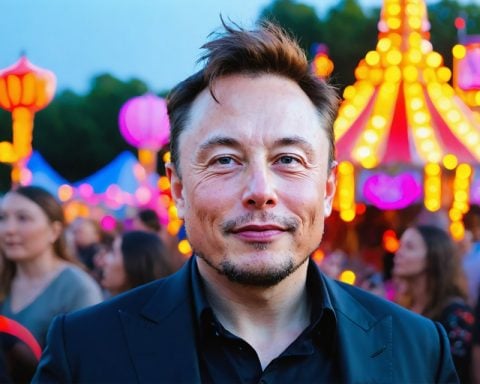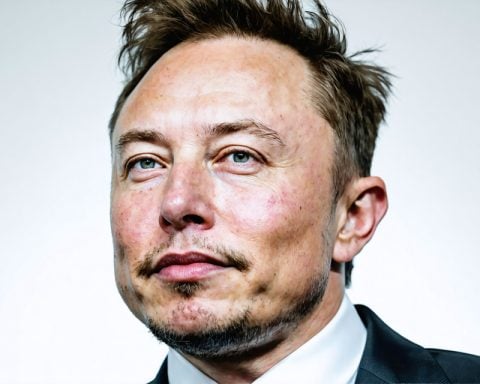- Elon Musk’s net worth has decreased by $43 billion since Trump’s inauguration.
- Musk’s net worth peaked at $486 billion before the decline began.
- Toyota’s stock fell by 5.2% in one day due to fears surrounding new tariffs.
- These tariffs target imports from Canada, Mexico, and China, affecting Tesla’s supply chain.
- Operational costs may increase significantly for Tesla, especially at the Shanghai Gigafactory.
- SpaceX may also face rising costs for projects, despite being a private company.
- <i)The potential removal of the $7,500 EV tax rebate could negatively affect sales and market dynamics.
- Musk’s response to these economic challenges will be crucial as the situation evolves.
In a dramatic twist, Elon Musk, the visionary behind Tesla and SpaceX, has seen his staggering net worth plummet by $43 billion since President Donald Trump’s inauguration. Once soaring at a peak of $486 billion, Musk’s finances are now feeling the sting of new tariffs intended to reshape trade policies.
As the world watches Musk’s every move, the looming threat of tariffs on imports from Canada, Mexico, and China has sent shockwaves through Tesla’s stock, which fell by 5.2% in a single day. With the automotive giant relying on a complex global supply chain for materials crucial to electric vehicle production, these trade barriers pose a grave threat. As tariffs on Chinese goods go into effect, whispers of retaliatory measures from China raise fears that operational costs will skyrocket—potentially crippling sales from Tesla’s Shanghai Gigafactory.
While Musk’s other venture, SpaceX, is secured from market volatility due to its private status, it’s not immune to these shifts. Increased component costs for major projects like Starlink could indirectly hamper Musk’s overall worth.
As analysts caution against the economic uncertainty these tariffs bring, Musk’s strategies will need re-evaluation. The stakes couldn’t be higher, as looming adjustments such as the proposed elimination of the $7,500 federal tax rebate for electric vehicles could further influence the marketplace.
This calamity paints a vivid picture of how swiftly fortunes can change, reminding us that even titans like Musk must navigate the treacherous waters of political policy. Stay tuned, because the ripple effects of these decisions are just beginning to unfold.
Elon Musk’s Financial Rollercoaster: What’s Next for Tesla and SpaceX?
Overview of Recent Financial Changes
Elon Musk, known for his role as the CEO of Tesla and SpaceX, has recently faced a dramatic decrease in his net worth due to shifting political landscapes and aggressive trade policies dating back to President Trump’s inauguration. The $43 billion drop from his pinnacle of $486 billion underscores the volatility of high-stakes businesses driven by global supply chains.
Current Market Insights
1. Market Forecasts: The Impact of Tariffs
With tariffs hitting imports from key nations like Canada, Mexico, and China, Tesla’s reliance on international suppliers is now a double-edged sword. The 5.2% drop in Tesla’s stock not only reflects immediate market reactions but is also a harbinger of potential operational cost increases. Analysts project that if tariffs continue or escalate, Tesla may be forced to pass costs onto consumers, risking demand for electric vehicles (EVs).
2. Future Trends: Political Influences on the EV Market
Political decisions, including the proposed elimination of the $7,500 federal tax rebate for electric vehicles, are expected to influence purchasing behavior significantly. As the EV market grows, the dependency on government incentives becomes critical for manufacturers like Tesla to maintain competitive pricing.
3. Innovations and Adaptations: Musk’s Next Moves
To counteract potential setbacks from rising costs and tariffs, Musk and Tesla may need to innovate more aggressively. This could involve increasing local sourcing of materials or accelerating the rollout of new models that better meet consumer demands without cost increases.
Key Questions and Answers
Q1: How do tariffs affect Tesla’s manufacturing processes?
A1: Tariffs on imports can lead to increased costs for materials required in manufacturing. Tesla’s dependency on global suppliers means that if material costs rise, the company may face challenges maintaining its profit margins, potentially leading to higher vehicle prices and a decline in sales.
Q2: What are the anticipated market reactions to the potential removal of EV tax incentives?
A2: The removal of EV tax incentives like the $7,500 rebate could discourage potential buyers, leading to reduced sales. This could have a cascading effect on Tesla’s stock performance and overall market position, compelling the company to rethink pricing strategies and marketing approaches.
Q3: How might SpaceX be indirectly affected by changes in Tesla’s fortunes?
A3: Although SpaceX is more insulated due to its private status and diversified project portfolio, Musk’s overall wealth is interconnected with his ventures. Financial strains at Tesla could limit Musk’s ability to fund SpaceX initiatives, leading to delays or shifts in focus from ambitious projects like Starlink.
Additional Information
The impact of political measures on the electric vehicle industry has gained traction, emphasizing the necessity for firms like Tesla to navigate not just marketplace shifts but also political landscapes.
For more detailed insights on Elon Musk’s ventures and their implications, visit Tesla’s Official Site and SpaceX’s Official Site.


















